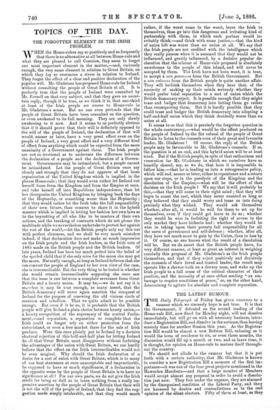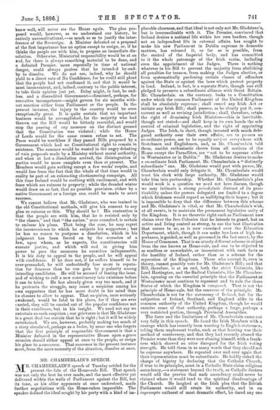THE LATEST RUMOUR.
THE Daily Telegraph of Friday has given currency to a rumour which we sincerely hope is not true. It is that the Government, if defeated on the second reading of the Home-rule Bill, now fixed for Monday night, will not dissolve immediately, but will go on with all necessary business, intro- duce a Registration Bill, and dissolve in the autumn, thus leaving scarcely time for another Session this year. As the Registra- tion Bill would be almost a new Reform Bill, reducing as it would the term of residence to six, or even three months, the discussion would fill up a month or two, and so leave time, it is thought, for opinion on Home-rule to mature itself through- out the country.
We should not allude to the rumour but that it is put forth with a certain authority, that Mr. Gladstone is known to consider a new Registration Bill a measure of the first im- portance—it was one of the four great projects mentioned in the Hawarden Manifesto—and that a large number of Members would accept almost any proposal in order to avoid a dissolu- tion just now. They fret under the expense, they are alarmed by the disorganised condition of the Liberal Party, and they are harassed by doubts and contradictions as to the real opinion of the silent electors. Fifty of them at least, as they know well, will never see the House again. The plan pro- posed would, however, as we understand our history, be entirely unconstitutional,—so much so as to justify the inter- ference of the Sovereign. A Minister defeated on a proposal of the first importance has no option except to resign, or, if he thinks the people are with him, to propose an immediate dis- solution. Otherwise, Ministerial responsibility would be at an end, for there is always something material to be done, and a defeated Premier, more especially in time of national danger, could always profess that he intended by-and- by to dissolve. We do not see, indeed, why he should yield to a direct vote of No Confidence, for he could still plead that the people had not confirmed it, and that it would be most inconvenient, and, indeed, contrary to the public interest, to take their opinion just yet. Delay might, in fact, be end- less, and a discredited Government—dismissed, perhaps, for executive incompetence—might govern for six months with- out sanction either from Parliament or the people. In the present instance, the injury to the country would be even exceptionally great. It is quite certain that no important business would be accomplished, for the majority who had thrown out the Bill would be bitterly resentful, and would stop the passing of any measure on the distinct ground that the Constitution was violated ; while the House of Lords would for the same reason refuse to act. The Peers would be worthless if they passed Bills proposed by a Government which had no Constitutional right to remain in existence. The summer would be wasted in the angry debating of vain proposals made by a Ministry without moral authority, and when at last a dissolution arrived, the disintegration of parties would be more complete even than at present. The Members would gain nothing except a few weeks' respite, and would lose from the fact that the whole of that time would in reality be part of an exhausting electioneering campaign. All this time Ireland would be seething with excitement, and with fears which are ruinous to property ; while the dreaded winter would draw on so fast, that no possible provision, either by a native Government or a foreign one, could be made to avert excesses.
We cannot believe that Mr. Gladstone, who was trained in the old Constitutional methods, will give his consent to any plan so ruinous as this. Why should he ? His contention is that the people are with him, that he is resisted only by " the classes," and that "the nation," once consulted, is certain to endorse his plans. That being the case, he may regret the inconvenience to which he subjects his supporters ; but he has no reason to postpone a dissolution, which in his judgment has been forced on by the secession of a few, upon whom, as he expects, the constituencies will execute justice, and which will end in giving him power to pass the measures he considers indispensable. It is his duty to appeal to the people, and he will appeal with confidence. If he does not, if he suffers himself to be over-persuaded, he will undoubtedly lose more in reputa- tion for firmness than he can gain by popularity among intending candidates. He will be accused of fearing the issue, and of wishing to call a new constituency into existence before it can be tried. He has already given way too much, and if he protracts the struggle, may rouse a suspicion among his own supporters that he has more doubt in his mind than be chooses to allow to appear. That suspicion, once seriously awakened, would be fatal to his plans, for if they are ever carried, they will be carried out of the popular confidence not in their excellence, but in his insight. We need not say we entertain no such suspicion ; our grievance is that Mr. Gladstone is a great deal too certain that he is right ; but it will be widely entertained. We are, however, probably making too much of a story circulated, perhaps as a feeler, by some one who forgets that the first principle of responsible Government is that a Minister defeated in the representative House upon a grave occasion should either appeal at once to the people, or resign his place to a successor. That successor in the present instance must, from the mere necessity of the situation, dissolve at once.



































 Previous page
Previous page